Livio Senigalliesi: Imagine No Heaven
© Livio Senigalliesi, Inside the Balkan Route
2017
3:02
Interview by Stefania Zorzi , May 2020
I was lucky enough to meet Livio Senigalliesi in 2018 during SEGNI: Photography Festival in Capo di Ponte (Brescia-Italy), we were both invited to exhibit each other's projects. Coming from different formations and generations, at first glance we could seem very distant, if not for the use of the photographic medium. It was not so. The meeting to speak, not only professionally but above all humanly (not only in front of our works, but in our hearts), has brought to light an emotional affinity and the common, central and fundamental theme that belongs to us: the human being and its stories.
From that moment a stimulating friendship was born, which led to the collaboration in the organization of his personal exhibition "Side Effects" in the GrenzART Gallery in Hollabrunn (Lower Austria) and meetings with various students attending high schools in the town. But life is full of fantastic connections and so through the meeting with Roberto Muffoletto this accurate and in-depth exhibition of the work of Livio Senigalliesi is achieved, touching on essential points of his long experience as a journalist, photojournalist and person. This gives me the opportunity to ask Livio questions related to his project of meetings in schools, in which he shows his photographic work as a war reporter and the stories he has collected during his career. A project that I consider of fundamental importance, useful for raising awareness and greater awareness of the historical events of the last decades and the mechanics that are within them: “Knowing the past to understand the present” as Livio says to his students in the hope of an opening of eyes, ears and above all heart towards a better world.
Here we are, dear Livio. Enthusiastic start with questions.
In addition to the numerous exhibitions, books and videos, conferences, participation in television programs, you are passionately engaged in a meeting project, with various students, regarding your professional activity and experience. How did this idea come about?
For some years - due to health problems - I have had to limit my activity in areas at risk. The time has come to reflect on the work done and give it a different purpose. I have lived for 30 years riding on lightning, from one conflict to another. Now is the time to put a lot of experience to use and make it available to others. I started proposing to the schools some in-depth meetings on the historical facts of our present not addressed by textbooks. And I immediately understood that there was a great need to understand what really happens in the world. So the photographs I produced for the newspapers became a didactic tool.
This part of your work is certainly very important and necessary, especially in our contemporary world. How do students react to your story and images?
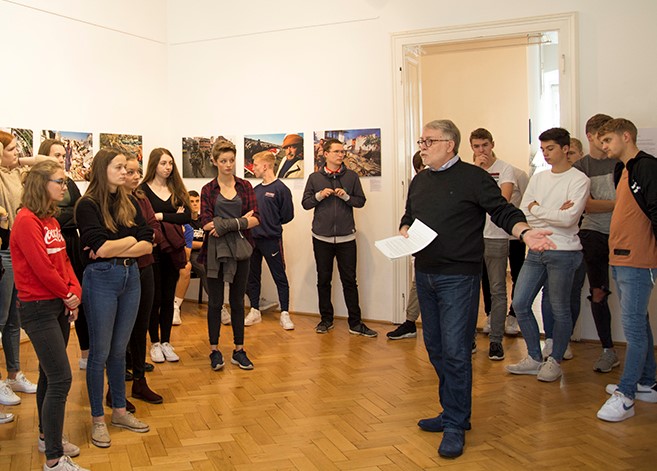 The students are thirsty for knowledge and above all they are fascinated by my passionate stories of life, which move their consciences and give them the opportunity to deepen their knowledge of important moments in recent history through facts that concern us and that are generally underestimated or badly told by the mainstream media. My photographs taken on the front lines are shocking and the students discover the cruelty of war. The new generations have grown up far from the pains and agony of death but need to become aware to appreciate peace and develop awareness of what is happening in the world.
The students are thirsty for knowledge and above all they are fascinated by my passionate stories of life, which move their consciences and give them the opportunity to deepen their knowledge of important moments in recent history through facts that concern us and that are generally underestimated or badly told by the mainstream media. My photographs taken on the front lines are shocking and the students discover the cruelty of war. The new generations have grown up far from the pains and agony of death but need to become aware to appreciate peace and develop awareness of what is happening in the world.
It is often said that young people today do not know history or that they are not interested in in-depth information. What is your feedback? Are they aware of past episodes and what is happening today? What vision do young people have of the present and the future?
I think we shouldn't generalize. I found students with an open and bright mind, enthusiastic about the opportunity to go deeper into things. It seems that they are waiting for the occasion, a meeting that gives them the stimulus to have a different and more critical vision of the past and the present. Over the years, special ties have been created with teachers who support the importance of an external contribution and there are cities where they have been calling me for a few years because the schools have appreciated my collaboration. I give everything myself and the students reciprocate with esteem and enthusiasm.
These meetings take place in high schools and universities. What differences do you find between the different school typologies?
My approach is different depending on the situation. A student of the Liceo Classico has a different setting and culture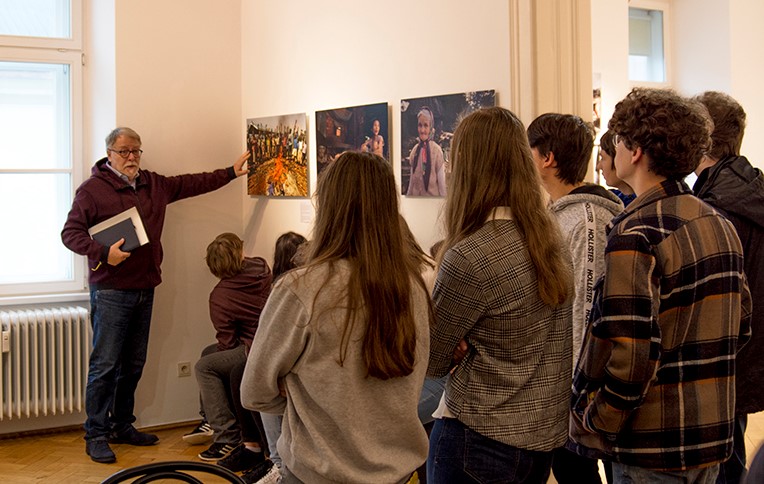 than a pupil of a technical institute. I adapt to their needs by creating empathy and making myself available to them, in harmony with their needs. The boys feel it and appreciate it by participating with attention and enthusiasm. The story of a "survivor" transforms those hours of lessons into a new debate made of real emotions. With the students of the University I change register. They are adults with good cultural foundations who need a concrete and high profile study. It is a real "Master" for students of the Faculty of Contemporary History, Mass Communication Sciences and Anthropology. My Memories of a war reporter has become a research tool, a valuable textbook. Students read it and are overwhelmed by it. During our meetings I answer a flood of questions and we definitely get to the heart of my experiences in the field by the deepening pages of history that are not written on textbooks.
than a pupil of a technical institute. I adapt to their needs by creating empathy and making myself available to them, in harmony with their needs. The boys feel it and appreciate it by participating with attention and enthusiasm. The story of a "survivor" transforms those hours of lessons into a new debate made of real emotions. With the students of the University I change register. They are adults with good cultural foundations who need a concrete and high profile study. It is a real "Master" for students of the Faculty of Contemporary History, Mass Communication Sciences and Anthropology. My Memories of a war reporter has become a research tool, a valuable textbook. Students read it and are overwhelmed by it. During our meetings I answer a flood of questions and we definitely get to the heart of my experiences in the field by the deepening pages of history that are not written on textbooks.
How has the experience of collaborating with teachers and teachers in the implementation of the project so far been?
Generally it is the teacher who contacts me and invites me to the school. They read my book or found my website and call me. The teacher usually considers that the contribution of an external "specialist" is useful. In recent years, real partnerships have been created with some high schools and university faculties. A real shared project is created to improve the teaching and critical knowledge of the students who respond in a very positive way by requesting my presence the following year.
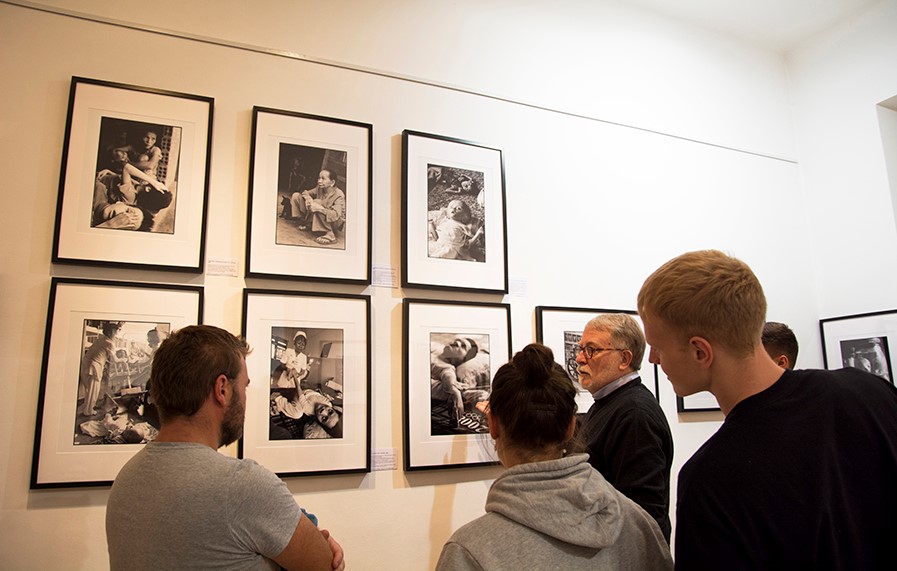
I had the opportunity to be present at your meetings with the students of the classical high school in Hollabrunn (Lower Austria) and it was exciting and intense. It is not a scroll between the images of the exhibition and a description of facts, but a journey into the past / present that deeply touches the human soul in its sometimes more hidden emotions. Stories with the soul and with a strong emotional charge; you feel that those stories (personal and worldwide) are still around and within you, that accompany you continuously. How do you live with this call of memory and sharing in front of young people? On your personal side, does it bring benefits or rekindle anxieties and fears? What sensations and changes are stimulated? What do these encounters bring to you?
The meetings with the students give me strong stimuli and are very positive because they allow me to make a qualitative leap, a change of role - from photojournalist to storyteller / narrator. These collective moments also serve me to process the trauma, to live my adventures in hell in a more detached way. They are therefore very useful because I give my experience and knowledge to others and at the same time I find a reason for so much suffering deriving from the hard experiences lived for so many years on the front line.
Although you have seen many atrocities, hearing your stories shines through your strength, the struggle and the desire for justice, the vision of a positive change. Sharing this with young people is essential. Do you perceive a different hope, sensitivity and humanity within them?
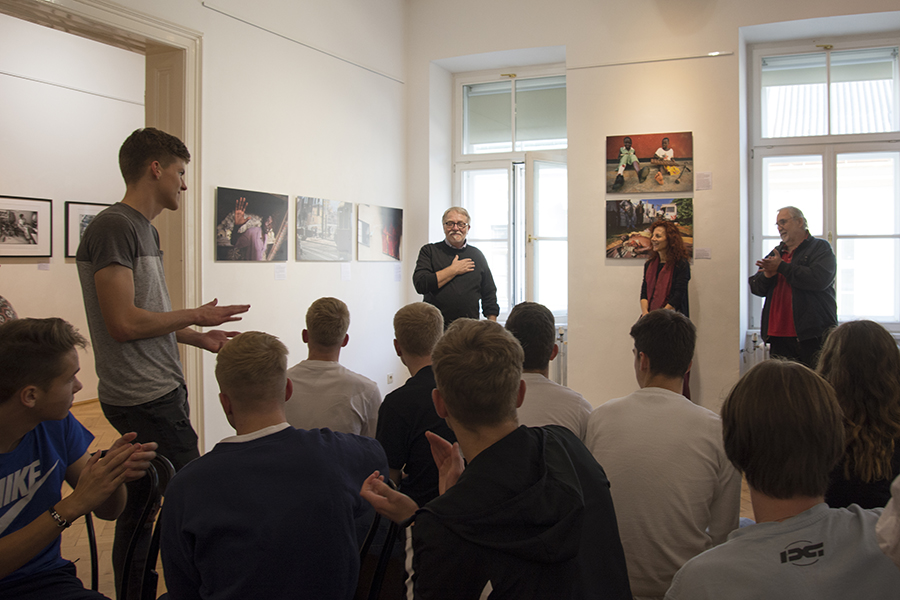 My experience as a "teacher" has allowed me to get to know the young people better and to find in them great skills and acute sensitivity. They seem superficial but only need a stimulus. They need to believe it and they can do wonderful things. Lately, during this lockdown period, I have taught distance students of an Anthropology course at the University of Milan Bicocca. Despite the physical distance, we had a really fantastic exchange of ideas and great empathy. So I am extremely confident in the method and opportunities that these educational projects can give.
My experience as a "teacher" has allowed me to get to know the young people better and to find in them great skills and acute sensitivity. They seem superficial but only need a stimulus. They need to believe it and they can do wonderful things. Lately, during this lockdown period, I have taught distance students of an Anthropology course at the University of Milan Bicocca. Despite the physical distance, we had a really fantastic exchange of ideas and great empathy. So I am extremely confident in the method and opportunities that these educational projects can give.
What is the anecdote or question that was presented to you that most impressed you during the various meetings?
Among the hundreds of meetings held in recent years, a 5th grade boy from a Paris school asked me the most acute question. Their teacher had prepared them properly and that day they were waiting for me full of emotion and questions. After a brief introduction, the debate started and Alain asked me: “With the advent of digital photography and photo editing tools, do you think photography can still be considered a reliable document?”. For a moment I was amazed by the sagacity of the question. I immediately elaborated on an answer up to the situation and I think I was exhaustive. I remember meeting that class with great emotion. They were children but had a strong self-esteem and a great maturity. I think a lot depends on how the teacher motivated and trained them waiting for the meeting. The role of the school is really still fundamental in the formation of the men and women of tomorrow.
The meetings do not end at the end of the conference but contacts with teachers and students continue through Facebook and video conferences via Skype. What is your vision towards these technological means of communication in relation to interpersonal exchanges?
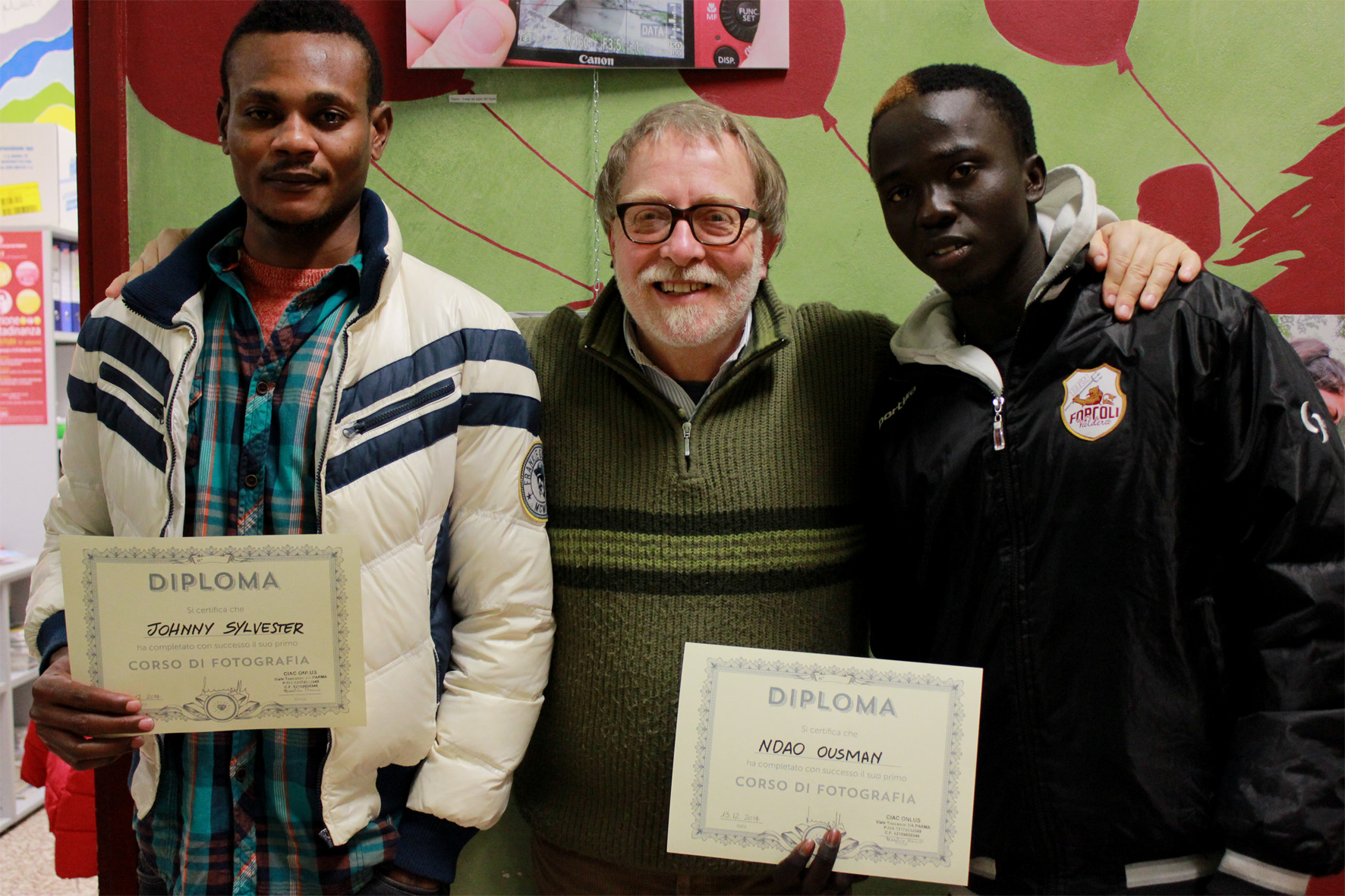 Photographer unkown
Photographer unkown
Generally I prefer direct meetings but the lockdown phase experienced has given us the opportunity to understand the potential of digital communication tools. I believe that they cannot completely replace the direct meeting but they are of great help. At the same time I think they are really useful if everyone can enjoy it. The digital divide in Italy is still a sensitive and worrying fact. Data from the Ministry of Education say that 20% of the student population was unable to follow distance teaching due to the lack of computers and telephone lines. This gap - due to technical or economic problems - must be absolutely canceled if equality of study conditions is to be established. There is still much to be done in this regard.
In the video interview on VASA, you tell Roberto Muffoletto that one of your paranoia is not knowing why you survived. Do you ever think that this project is a possible answer to your question, the fact of being able to tell your experience and above all to sensitize young people who are the future of society?
War is the worst experience a man can experience. I have lived through terrible situations and have been exposed for too long (30 years) to the violence, death and pain of others. I risked a lot and I am suffering from a post-traumatic syndrome that I will carry on my shoulders all my life. I don't hide that I feel guilty for surviving. It is typical of war veterans. The only medicine is knowing how to fully appreciate the affections and joys of life. Teaching is one of these.
How do you see this project of yours in the future?
Giving visibility to my work, holding public debates and organizing photographic exhibitions is my main activity but if I think of the future I believe that teaching takes on a fundamental role. I continue to receive new requests for collaboration and collaborations with two universities are expected next year. I am confident and happy to have an active role in this company.
I thank you very much Livio for your answers. As always, it has been an increase and a source of hope for a better world.
© Stefania Zorzi, Milan, June 12, 2020
All images © Stefania Zorzi, 2020